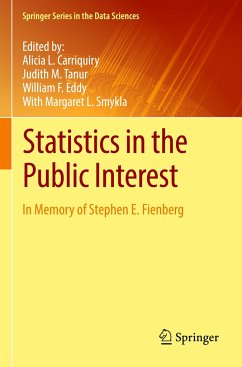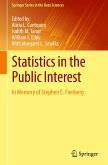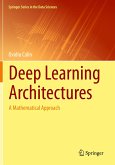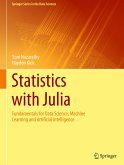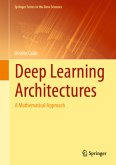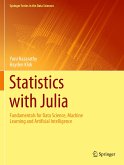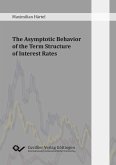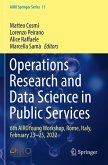Statistics in the Public Interest
In Memory of Stephen E. Fienberg
Herausgegeben:Carriquiry, Alicia L.; Tanur, Judith M.; Eddy, William F.
Statistics in the Public Interest
In Memory of Stephen E. Fienberg
Herausgegeben:Carriquiry, Alicia L.; Tanur, Judith M.; Eddy, William F.
- Broschiertes Buch
- Merkliste
- Auf die Merkliste
- Bewerten Bewerten
- Teilen
- Produkt teilen
- Produkterinnerung
- Produkterinnerung
This edited volume surveys a variety of topics in statistics and the social sciences in memory of the late Stephen Fienberg. The book collects submissions from a wide range of contemporary authors to explore the fields in which Fienberg made significant contributions, including contingency tables and log-linear models, privacy and confidentiality, forensics and the law, the decennial census and other surveys, the National Academies, Bayesian theory and methods, causal inference and causes of effects, mixed membership models, and computing and machine learning. Each section begins with an…mehr
Andere Kunden interessierten sich auch für
![Statistics in the Public Interest Statistics in the Public Interest]() Statistics in the Public Interest97,99 €
Statistics in the Public Interest97,99 €![Deep Learning Architectures Deep Learning Architectures]() Ovidiu CalinDeep Learning Architectures49,99 €
Ovidiu CalinDeep Learning Architectures49,99 €![Statistics with Julia Statistics with Julia]() Yoni NazarathyStatistics with Julia134,99 €
Yoni NazarathyStatistics with Julia134,99 €![Deep Learning Architectures Deep Learning Architectures]() Ovidiu CalinDeep Learning Architectures68,99 €
Ovidiu CalinDeep Learning Architectures68,99 €![Statistics with Julia Statistics with Julia]() Yoni NazarathyStatistics with Julia134,99 €
Yoni NazarathyStatistics with Julia134,99 €![The Asymptotic Behavior of the Term Structure of Interest Rates The Asymptotic Behavior of the Term Structure of Interest Rates]() Maximilian HärtelThe Asymptotic Behavior of the Term Structure of Interest Rates32,00 €
Maximilian HärtelThe Asymptotic Behavior of the Term Structure of Interest Rates32,00 €![Operations Research and Data Science in Public Services Operations Research and Data Science in Public Services]() Operations Research and Data Science in Public Services112,99 €
Operations Research and Data Science in Public Services112,99 €-
-
-
This edited volume surveys a variety of topics in statistics and the social sciences in memory of the late Stephen Fienberg. The book collects submissions from a wide range of contemporary authors to explore the fields in which Fienberg made significant contributions, including contingency tables and log-linear models, privacy and confidentiality, forensics and the law, the decennial census and other surveys, the National Academies, Bayesian theory and methods, causal inference and causes of effects, mixed membership models, and computing and machine learning. Each section begins with an overview of Fienberg's contributions and continues with chapters by Fienberg's students, colleagues, and collaborators exploring recent advances and the current state of research on the topic. In addition, this volume includes a biographical introduction as well as a memorial concluding chapter comprised of entries from Stephen and Joyce Fienberg's close friends, former students, colleagues, and otherloved ones, as well as a photographic tribute.
Produktdetails
- Produktdetails
- Springer Series in the Data Sciences
- Verlag: Springer / Springer International Publishing / Springer, Berlin
- Artikelnr. des Verlages: 978-3-030-75462-4
- 1st edition 2022
- Seitenzahl: 596
- Erscheinungstermin: 23. April 2023
- Englisch
- Abmessung: 235mm x 155mm x 32mm
- Gewicht: 890g
- ISBN-13: 9783030754624
- ISBN-10: 3030754626
- Artikelnr.: 67678757
- Herstellerkennzeichnung Die Herstellerinformationen sind derzeit nicht verfügbar.
- Springer Series in the Data Sciences
- Verlag: Springer / Springer International Publishing / Springer, Berlin
- Artikelnr. des Verlages: 978-3-030-75462-4
- 1st edition 2022
- Seitenzahl: 596
- Erscheinungstermin: 23. April 2023
- Englisch
- Abmessung: 235mm x 155mm x 32mm
- Gewicht: 890g
- ISBN-13: 9783030754624
- ISBN-10: 3030754626
- Artikelnr.: 67678757
- Herstellerkennzeichnung Die Herstellerinformationen sind derzeit nicht verfügbar.
¿Alicia Carriquiry was born in Montevideo, Uruguay. Since 1990, she has been on the faculty in the Department of Statistics at Iowa State University. She is currently Distinguished Professor of Liberal Arts and Sciences, holds the President's Chair in Statistics, and is Director of the Center for Statistics and Applications in Forensic Evidence (CSAFE), a federally funded research center. Alicia is an Elected Member of the National Academy of Medicine, a Fellow of the American Statistical Association, a Fellow of the Institute of Mathematical Statistics, a Fellow of the International Society for Bayesian Analysis, a Fellow of the American Association for the Advancement of Science, and an elected member of the International Statistical Institute. She was named Technical Advisor for the Association of Firearm and Toolmark Examiners in 2018 and was elected to the American Academy of Forensic Sciences as an Associate Member in 2020. Alicia's research interests include measurement error modeling, survey sampling and Bayesian methods. In recent years, she has become interested in statistical learning algorithms and their application in various disciplines, in particular in forensic science and criminal justice. Alicia met Steve while she was still a doctoral student, and she could always count on him for friendship, good advice, and mentoring. He was a close and trusted friend to her for almost 30 years. Judith M. Tanur is Distinguished Teaching Professor Emerita, Department of Sociology, at Stony Brook University. She is a Fellow of the American Statistical Association, and the American Association for the Advancement of Science, and the Association for Psychological Science, an elected member of International Statistical Institute, and recipient of ASA's Founders' Award. Tanur was a member of the Committee on National Statistics of the National Research Council, chairing its Advanced Research Seminar on Cognitive Aspects of Survey Methodology. She also was an ASA/NSF/BLS Senior Research Fellow and served on the ASA Advisory Committee for SIPP, as well as NSF Panels and visiting committees. Tanur has served on the Advisory Committee to the NSF Director for SBE and the Board of Directors of SSRC. In retirement she continues to serve on the Board of Trustees of NORC and has served on the Committee of International Advisors for the SSRC Vietnam Population Survey, as a member of the AAAS On Call Scientists and their Committee on Scientific Freedom and Responsibility, and on the Advisory Committee for the American Association of Arts and Sciences project on Humanities Indicators. She worked for years with Steve Fienberg on a NSF-funded project on the parallels between randomized experiments and probability-based sample surveys, much of the work being done at her home in Montauk where Steve, Joyce and their family visited regularly for many summers. William F. Eddy was on the faculty of Carnegie Mellon University from 1976 until his retirement as John C. Warner Professor of Statistics in 2020. He also held positions in Machine Learning, Biological Sciences, and the Center for the Neural Basis of Cognition at CMU and in the Department of Neurobiology at the University of Pittsburgh. Bill was the founding editor of the Journal of Computational and Graphics Statistics (a joint publication of the American Statistical Association, the Institute of Mathematical Statistics, and the Interface Foundation of North America since 1991) and, together with Steve Fienberg, founded CHANCE magazine in 1988. He was very active in the National Academies and is the only person to have served as chairman of both its Committee on Applied and Theoretical Statistics and its Committee on National Statistics. He was named a Lifetime National Associate of the Academies in 2007. Bill's late wife Connie and he were close friends of both Steve and Joyce Fienberg for more than 35 years. Margaret (Margie) Smykla joined the Department of Statistics at Carnegie Mellon University in August, 1980 - at the same time Steve Fienberg came to CMU -- and can remember boxes and boxes of his books being delivered to the Department's small central administrative office. She interacted and worked with Steve, his post-doctoral research scientists, and graduate students over the next several decades. In her early role as editorial assistant, she had the opportunity to work with Steve on CHANCE magazine, which he co-founded with Bill Eddy. Knowing she had writing aspirations, Steve insisted she write an article for CHANCE. His support and confidence in her abilities kicked off a freelance writing career which exists to this day (And thrills her mother that her writing degree from the University of Pittsburgh in 1978is being put to good use!). During the many social events in which Margie participated, she had the chance to get to know Steve's wonderful wife, Joyce, and the couple's two fine sons, Anthony and Howard, and communicated with them even after Steve's death. The reminiscences and photos obtained on the occasions of Steve's 65th birthday and his Emeritus attainment were gathered and organized by Margie. She is a native of Pittsburgh and a grandmother, her favorite role of all. She also relishes the go-to role in the Department for anything alumni-related as, after 40 years, she knows just about everyone!
Section 1: Theory and Methods for Categorical Data: Introduction to Section 1: Theory and Methods for Categorical Data(Eddy).- Prediction for Categorical Data (Wasserman).- Capture-Recapture for Casualty Estimation and Beyond: Recent Advances and Research DirectionsDaniel (Manrique-Vallier).- Algebraic statistics, tables, and networks: The Fienberg advantage (Petrovi´c).- Section 2: Theory and Application of Bayesian Methods: Introduction to Section 2: Bayesian Theory and Applications (Carriquiry).- Colorful Stars and Black Boxes: Bayesian Analysis of Stellar Populations (Meng).- The Ways of Bayes (In memory of Stephen Fienberg) (Louis).- Probability Forecasts and Prediction Markets (Mortera).- Determinantal Priors for Variable Selection (Rockova).- Section 3: Statistics and the Law: Introduction to Section 3: Statistics and the Law (Eddy).- Bayes and the Law (Kadane).- Statistical Considerations for the Analysis and Interpretation of Forensic Evidence (Stern).- Differences between Bayes Factors and Likelihood Ratios for Quantifying the Forensic Value of Evidence (Ommen).- Statistical Issues in Assessing the Reliability of Eyewitness Identification (Kafadar).- Section 4: Causal Analysis : Introduction to Section 4: Causal Analysis (Carriquiry).- Causes of Effects and Effects of Causes(Cuellar).- What Can Group Level Data Tell Us About Individual Causality? (Musio).- Evidence to Guide Decision Making in Clinical Medicine (Singer).- What Can Policies Do and How Can Social Science Help? (Bradburn).- Section 5: Surveys and Censuses: Introduction to Section 5: Surveys and Census (Tanur).- Multiple Imputation for Nonignorable Item Nonresponse in Complex Surveys Using Auxiliary Margins (Reiter).- Insights into the Decision on Whether to Statistically Adjust the 2000 Census for Coverage Errors (Thompson).- 2030 -- A Sensible Census, In Reach (Prewitt).- Perturbed M-Estimation: A Further Investigation of Robust Statistics for Differential Privacy (Slavkovic).- Section6: Official Statistics : Introduction to Section 6: Official Statistics (Tanur).- The History of "The Politics of Population" in the United States (Anderson).- Fostering Statistical Rigor for Evidence-Based Policy at the National Academies of Sciences, Engineering, and Medicine (Citro).- New data sources and inference methods for official statistics (Brakel).- Understanding the United States' Official Statistics System (Wallman).- Section 7: Steve and Joyce as we knew them : Introduction to Section 7: Steve and Joyce as we knew them (Tanur).- Stephen Elliot Fienberg, an Obituary (Stigler).-. Bill Eddy remembers Steve (Eddy).- Statistical Service (Reid).- Stephen Fienberg: Cause or Effect? Node or Edge? A Comparative Study (Stigler).- On the Origins of Data Visualization(Wainer).- "Belizaire," the CHANCE Restaurant Critic (Madansky).- Judy Tanur Remembers Steve (Tanur).- A Conversation with Stephen E. Fienberg (Tanur).- Reminiscences from Steve's 65th Birthday Celebration (Smykla).- Reminiscences from Steve's Emeritus Celebration (Smykla).- Joyce Fienberg, A Woman of Grace, and Wisdom (Leinhardt).- Obituary of Joyce Fienberg (Smykla).- Reminiscences of Joyce(Smykla).- Photographs.- Stephen Fienberg's Doctoral Advisees and Co-Advisees.
Section 1: Theory and Methods for Categorical Data: Introduction to Section 1: Theory and Methods for Categorical Data(Eddy).- Prediction for Categorical Data (Wasserman).- Capture-Recapture for Casualty Estimation and Beyond: Recent Advances and Research DirectionsDaniel (Manrique-Vallier).- Algebraic statistics, tables, and networks: The Fienberg advantage (Petrovi´c).- Section 2: Theory and Application of Bayesian Methods: Introduction to Section 2: Bayesian Theory and Applications (Carriquiry).- Colorful Stars and Black Boxes: Bayesian Analysis of Stellar Populations (Meng).- The Ways of Bayes (In memory of Stephen Fienberg) (Louis).- Probability Forecasts and Prediction Markets (Mortera).- Determinantal Priors for Variable Selection (Rockova).- Section 3: Statistics and the Law: Introduction to Section 3: Statistics and the Law (Eddy).- Bayes and the Law (Kadane).- Statistical Considerations for the Analysis and Interpretation of Forensic Evidence (Stern).- Differences between Bayes Factors and Likelihood Ratios for Quantifying the Forensic Value of Evidence (Ommen).- Statistical Issues in Assessing the Reliability of Eyewitness Identification (Kafadar).- Section 4: Causal Analysis : Introduction to Section 4: Causal Analysis (Carriquiry).- Causes of Effects and Effects of Causes(Cuellar).- What Can Group Level Data Tell Us About Individual Causality? (Musio).- Evidence to Guide Decision Making in Clinical Medicine (Singer).- What Can Policies Do and How Can Social Science Help? (Bradburn).- Section 5: Surveys and Censuses: Introduction to Section 5: Surveys and Census (Tanur).- Multiple Imputation for Nonignorable Item Nonresponse in Complex Surveys Using Auxiliary Margins (Reiter).- Insights into the Decision on Whether to Statistically Adjust the 2000 Census for Coverage Errors (Thompson).- 2030 -- A Sensible Census, In Reach (Prewitt).- Perturbed M-Estimation: A Further Investigation of Robust Statistics for Differential Privacy (Slavkovic).- Section6: Official Statistics : Introduction to Section 6: Official Statistics (Tanur).- The History of "The Politics of Population" in the United States (Anderson).- Fostering Statistical Rigor for Evidence-Based Policy at the National Academies of Sciences, Engineering, and Medicine (Citro).- New data sources and inference methods for official statistics (Brakel).- Understanding the United States' Official Statistics System (Wallman).- Section 7: Steve and Joyce as we knew them : Introduction to Section 7: Steve and Joyce as we knew them (Tanur).- Stephen Elliot Fienberg, an Obituary (Stigler).-. Bill Eddy remembers Steve (Eddy).- Statistical Service (Reid).- Stephen Fienberg: Cause or Effect? Node or Edge? A Comparative Study (Stigler).- On the Origins of Data Visualization(Wainer).- "Belizaire," the CHANCE Restaurant Critic (Madansky).- Judy Tanur Remembers Steve (Tanur).- A Conversation with Stephen E. Fienberg (Tanur).- Reminiscences from Steve's 65th Birthday Celebration (Smykla).- Reminiscences from Steve's Emeritus Celebration (Smykla).- Joyce Fienberg, A Woman of Grace, and Wisdom (Leinhardt).- Obituary of Joyce Fienberg (Smykla).- Reminiscences of Joyce(Smykla).- Photographs.- Stephen Fienberg's Doctoral Advisees and Co-Advisees.

